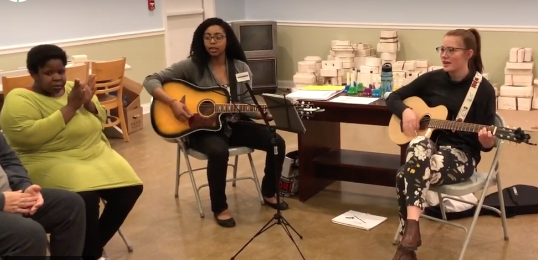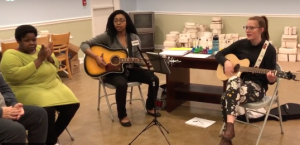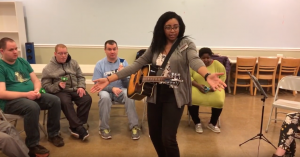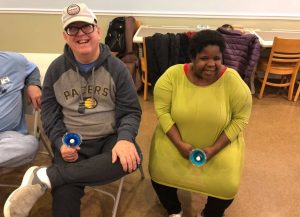UIndy partners with Sycamore Services to provide music therapy


When Sycamore Services was considering ways to enhance their client programs, they didn’t have to look far. The University of Indianapolis music therapy program is part of a blossoming partnership with Sycamore, which provides services to adults and children with intellectual and developmental disabilities and other conditions that can limit participation in life’s daily activities.
Consumers at Sycamore receive services paid for primarily through waiver funding. This can become an issue when those dollars run out, however. One of the programs that Sycamore offers is music therapy. “We have people on the waiver who get music therapy, and we also have people who would like to do music therapy, but because they utilize so many other services, they may not have enough waiver dollars to do it,” explained Trina Blackburn, project coordinator at Sycamore.
That’s where UIndy came in. “My first thought was connecting with UIndy to see if some music and art therapy students would be interested in coming to our day program and doing music for our clients,” said Blackburn.
“We reached out and explained what we were interested in doing, we told them about our idea of having some students come over and do some music and art, and hopefully try to have a long term partnership where the students can come over and do this like an internship.”
Because the UIndy students can provide music therapy through a partnership with Sycamore Services at a cost that is free to the consumers it opens up a host of new opportunities for them.
“For some of the consumers, it’s something different than they’d normally get to experience,” Blackburn said. “Because if it is not on their plan, they wouldn’t have the ‘waiver dollars’ to be able to experience it.”
The music therapy provided by UIndy students is also important because many of the consumers at Sycamore are unable to go to a concert or an art studio and experience those types of activities and there is no guarantee there is anyone on staff that is qualified to lead them.
“Our staff is great,” Blackburn said. “But they don’t have the expertise in doing art or music, so for us to be able to bring someone in that has that knowledge base, that helps tremendously.”
Jan Schreibman, director of the music therapy program, took two students to Sycamore to provide a music therapy session and determine the types of consumers that Sycamore’s day program served. After the success of the initial visit, Blackburn and Schreibman are hopeful the partnership will continue and expand once students are back on campus this fall.

 “We want this to be an ongoing partnership,” Blackburn said, “providing art and music for our consumers by utilizing UIndy students, even on a weekly basis. We’re so close to each other, it just makes sense!”
“We want this to be an ongoing partnership,” Blackburn said, “providing art and music for our consumers by utilizing UIndy students, even on a weekly basis. We’re so close to each other, it just makes sense!”
Music therapy provides many benefits for those who have intellectual or developmental disabilities. It can stimulate the mind, while being soothing or relaxing, but is also very interactive for the consumer.
Some ways that music therapy can help consumers achieve physical and psychological benefits include:
- Playing a drum to increase the mobility of their arms, which could eventually help them become more independent doing activities like eating and writing
- Singing the words along to preferred songs can help those with Alzheimer’s/dementia recall past experiences
- Singing can also help people with traumatic brain injuries or difficulty speaking learn to pronounce and say words more clearly, which helps them communicate in their daily lives
- Discussing and analyzing lyrics to songs, or writing lyrics to a song, can help people that struggle with depression relate to others, share experiences and self-express.
Practical experience is required for music therapy board certification, but that’s not the only reason it is important to UIndy students. “Practicum experiences are essential for music therapy students to gain experience working with different populations of people with varying needs,” said Amy Foley, who is serving as the UIndy clinical experience coordinator. “This hands-on experience allows students to learn from a board-certified music therapist and have a safe environment to practice skills they are learning through their coursework with people in the community.”
Providing this service is so important because it is about giving back to the community,” said professor Schreibman. “Opportunities like this help us identify how our resources can best fit and provide a service to others.”
“The music therapy program at UIndy is very hands-on and allows for a lot of experience doing supervised work in the field,” said Katelyn Snider ’20 (music therapy). “This has really prepared me to feel comfortable and confident in a professional setting.”
“My experiences working in places like Sycamore have really helped me grow academically and personally. I was able to become more comfortable relating to and communicating with all people.”
“We have so many people who could benefit from art and music in a small group setting” said Blackburn. “It gives them something to look forward to. You can tell that it really is bringing joy to their lives.”


